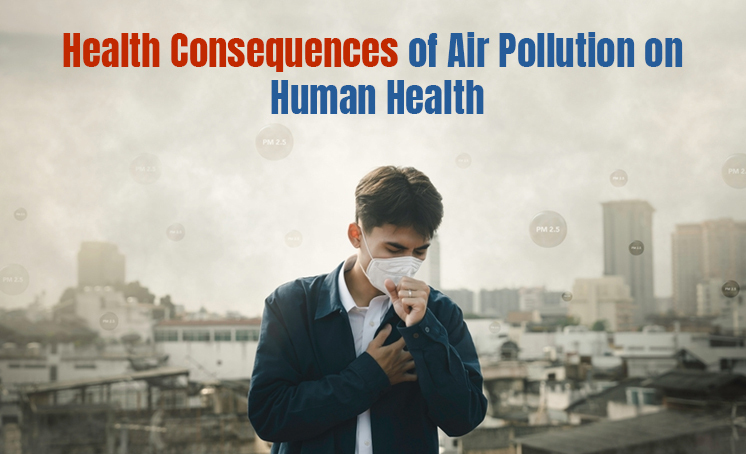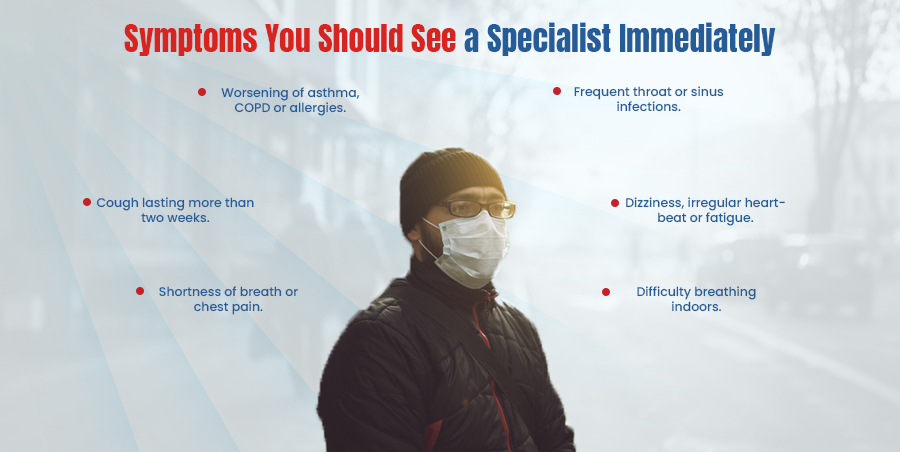Air Pollution on Human Health: Risks, Consequences and Solutions

Air pollution is one of the biggest threats to human health today. It is caused by harmful gases, smoke and fine particles that mix with the air we breathe. Fine particles like PM 2.5, nitrogen oxides and ground level ozone enter the lungs and blood with every breath. In Delhi NCR, pollution levels often cross the safe Air Quality Index (AQI) limit. Many people experience coughing, breathlessness and tiredness during high pollution days.
This exposure causes respiratory problems over time and weakens the heart. It also affects brain and immune function.
Guided by the Best Pulmonologist in Delhi NCR, our experts at PSRI Hospital focus on prevention, early diagnosis and long-term care for those affected by poor air quality. Understanding these risks and learning how to protect yourself from air pollution can help you stay healthy. Keep reading..
Risks & Consequences of Air Pollution on Human Health
Air pollution affects many parts of the body. The risks are not limited to the lungs. It can also harm the heart, brain and overall immunity. Let us understand these risks and consequences clearly.
1. Risk to Lungs and Breathing
The lungs are the first to face the effects of polluted air. When you breathe in smoke or dust, the particles settle deep inside.
Risks:
- Difficulty in breathing.
- Continuous cough or wheezing.
- Frequent throat or chest infections.
Consequences:
- Conditions like asthma and air pollution-related attacks.
- Chronic bronchitis or long-term inflammation of airways.
- Chronic Obstructive Pulmonary Disease where breathing becomes difficult with time.
- Permanent reduction in lung capacity.
Children, elderly people and those with weak immunity are most affected. Even non-smokers in Delhi often show lung damage similar to heavy smokers because of high pollution exposure.
2. Risk to the Heart and Circulatory System
Tiny particles from polluted air can enter the bloodstream and damage blood vessels.
Risks:
- Thickening of arteries.
- Increase in blood pressure.
- Reduced oxygen in the blood
Consequences:
- Higher heart attack risk.
- Worsening of cardiovascular diseases.
- Greater chance of stroke and air pollution-related complications.
3. Risk to Brain and Mental Health
Air pollution also affects the brain.
Risks:
- Reduced oxygen supply to the brain.
- Constant inflammation and stress inside brain tissues.
Consequences:
- Memory loss and cognitive decline.
- Fatigue and irritability.
- Mental health and pollution-related anxiety or mood swings.
Studies have shown that people in polluted cities often report poor concentration and low energy levels.
4. Risk During Pregnancy and in Children
Pregnant women and children are more vulnerable. Polluted air can harm growth and development.
Risks:
- Inhalation of toxic particles during pregnancy.
- Weak immune system in infants.

Consequences:
- Pregnancy complications such as high blood pressure or premature delivery.
- Low birth weight in babies.
- Child development issues such as asthma or poor lung growth.
- Fertility problems and endocrine disruption in adults.
5. Risk of Cancer and Early Death
Long-term exposure to air pollution has serious outcomes.
Risks:
- Prolonged contact with harmful gases and heavy metals.
- Weak body defense system due to repeated inflammation.
Consequences:
- Cancer risk especially lung cancer.
- Premature death due to pollution.
- Continuous strain on the body leading to early aging.
The World Health Organization lists air pollution among the top environmental causes of death. It is not just an environmental issue, it is a direct public health crisis.
How to Protect Yourself from Air Pollution
You cannot control outdoor pollution completely but you can reduce your exposure and its effects. Follow these practical steps for better health.
1. Daily Protection Habits
- Wear face masks and respirators preferably N95 or KN95 when you go out. Cloth masks do not block fine particles.
- Use certified air purifiers for homes equipped with True HEPA filters. Clean filters regularly.
- Keep indoor plants for clean air like areca palm or snake plants. They add freshness but cannot replace purifiers.
- Avoid peak traffic hours and stay indoors during smog alerts.
- Follow a healthy diet for pollution protection with foods rich in vitamin C, E and Omega-3 that reduce inflammation.
2. Medical and Preventive Steps
- Go for regular health check-ups and lung function tests.
- Quit smoking, keep windows closed when the AQI is high and ensure room ventilation when air quality improves.
- Seek timely help from the Best Pulmonologist in Delhi NCR for any breathing or chest problems.
- Use PSRI Hospital’s preventive healthcare programs designed for early detection of lung and heart damages due to pollution.
3. Community and Policy Support
- Choose renewable energy and electric vehicles (EVs) when possible.
- Encourage reforestation and afforestation in your local area.
- Use public transport or carpool to reduce vehicle emissions.
- Support Clean Air India Mission and National Clean Air Programme (NCAP) initiatives.
- Dispose of waste responsibly and avoid open burning.
Every small effort helps improve the air we share.
Symptoms You Should See a Specialist Immediately
Do not ignore early warning signs. Pollution-related illnesses often start with mild symptoms and become serious if not treated on time. Visit the best hospital in Delhi, if you notice:
Our Pulmonology & Critical Care department offers full diagnostic support 24×7. We use advanced tests like spirometry, imaging and blood analysis to assess pollution-related health issues.
Conclusion
The risks and consequences of air pollution on human health are serious but preventable with the right care, habits and requires daily attention. If you experience any warning signs, do not wait. Contact the Best Pulmonologist in Delhi NCR at PSRI Hospital for expert guidance and preventive treatment. Your health is in your hands. Clean air may not be fully in your control but your response to it is.
Call our 24×7 helpline +91 8484848417
FAQ’s
- What is a safe Air Quality Index (AQI) level?
Ans. An AQI below 50 is considered safe. Anything above 100 is unhealthy for sensitive groups and above 200 is harmful for everyone. Check Delhi’s AQI daily before outdoor activities. - Can air pollution cause heart and brain problems?
Ans. Yes. Polluted air triggers inflammation that narrows blood vessels, raising risks of heart attack, stroke and cognitive issues like poor focus and memory loss. - Do air purifiers and masks really help?
Ans. True HEPA air purifiers and properly fitted N95 masks can reduce particle exposure by up to 90%. They are effective support tools when used correctly. - When should I see a doctor for pollution-related issues?
Ans. If you have breathing difficulty, chronic cough or chest tightness for more than two weeks, see a specialist immediately. Early evaluation prevents serious complications. - Is indoor air always safe from pollution?
Ans. No. Indoor air can be polluted by dust, smoke or cooking fumes. Use air purifiers and ventilate your home when outdoor AQI improves.

 Book An Appointment
Book An Appointment Virtual Consultation
Virtual Consultation





